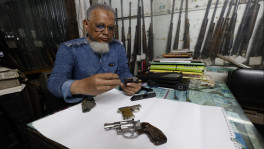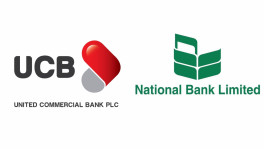Solar electric vehicles: A business prospect for Bangladesh
Battery run vehicles are tremendously popular in Bangladesh, and they are currently the cheapest public transport on local roads

On an early winter morning in 2014, two young men were waiting for the dawn by the side of Meghna river near the Bhairab Bridge.
As the Sun came out from other side of the river, the men packed and loaded their stuff onto a boat. They did one more important thing before beginning their journey – wiping the solar panels on the boat.
The boat was a home-made micro catamaran – built with fiberglass and powered solely by the energy from the Sun. Affectionately named Surjokonna [Bengali word for daughter of the sun], it was the first solar powered boat in Bangladesh to make inter-district travel through the rivers.
Experimental solar electric boat building started in Bangladesh a little earlier, in 2012. The writer of this article and his friend Masud A Hoque – the very two men mentioned above – had started designing and building solar powered boats as a hobby.
By 2016, four different models of small solar electric boats were built and tested. The fourth boat was built with the financial assistance from ICT division of the government of Bangladesh.
Electric boats had appeared elsewhere in the western world earlier, thanks to the efforts of individual innovators and commercial entities.
Solar boat MS Tûranor PlanetSolar circumnavigated the globe on the year 2012 to become the first solar powered transport to ever do that. Companies are now commercially producing electric boats, and solar electric yachts.
In 2017, under a UNDP funded project, five larger boats were built in Chuadanga district of Bangladesh. Later, two more were built in Chittagong, and at least one of those engaged in tourist service at a lake.
Very recently, an even larger solar powered catamaran is attracting tourists near Dhaka for silent river cruise that these electric vessels offer.
These boats are doing just fine, proving the feasibility of such vessels in Bangladesh. These vessels can use solar panels to directly power the propulsion system as they have larger space to install enough panels.
However, these boats are not yet commercially successful, partly because new technology often takes time to gain trust of the customers. It is clear that more investment on research and marketing of such vessels is necessary.
History of electric vehicles
The history of electric automobile is much older than many would imagine. The journey of first battery powered vehicles began in the early 19th century. But the first practical electric cars came on the streets in the second half of the 19th century thanks to French and English inventors.
The last decade of that century saw a rise of electric vehicles from different US automakers. Even electric taxis were a thing back then. New York City had a fleet of more than 60 electric taxis.
Famous car designers like Ferdinand Porsche and Henry Ford also developed their own electric cars at that time. Gasoline-powered cars emerged around the same time. Both had pros and cons, but eventually gasoline-powered cars triumphed over their electric counterpart in the early 20th century.

Return of electric car
A century later, electric cars have made a return. And this time, it looks more promising due to several factors.
Firstly, pressure is mounting on cutting emission, and on using more and more renewable energy sources to combat fossil-fuel-induced global warming.
Elon Musk, founder of Tesla- American electric vehicle and clean energy company, had stated that even when an electric vehicle is charged with conventional power source, it contributes to emission cut, because big power plants are more efficient than car engines.
Not to mention, using renewable energy sources to recharge car batteries is always preferable.
Secondly, battery technology has improved significantly in the meantime. With the advent of lithium ion and other lightweight batteries, which can store significantly more energy per unit volume compared to older lead acid batteries, electric vehicles (EVs) are gaining more popularity every day.
Also, EVs require little maintenance. In terms of range and speed, electric cars are now very competitive to fossil-fuel-powered cars.
As a result, despite higher battery charging time compared to refuelling time, car companies are increasingly leaning toward manufacturing electric cars, and a phase out of combustion engine car seems to be a matter of time.
German car giant Volkswagen revealed its plan to focus solely on making electric vehicles after 2026. Two months ago, a factory owned by Volkswagen has produced its last combustion engine vehicle, and concluded a 116-year history of manufacturing such cars.
The Zwickau car factory will produce only electric vehicle from now on.
At least 14 countries and 20 cities around the world have set their targets to ban the sale of passenger vehicles with combustion engines within a specified time.
Other EVs in Bangladesh
In the absence of up-to-date policy and regulations, full electric cars are still a rarity in Bangladesh.
The Bangladesh Road Transport Authority (BRTA) still needs to convert an electric car's power to conventional engine capacity in cc to determine the amount of tax, VAT and import duty to be imposed on the car.
They also need to seek help from Bangladesh University of Engineering and Technology (BUET) to do that. As the electric car engines are very powerful, government imposes a hefty duty on them instead of exempting them on environmental ground.
However, hybrid cars are there on the streets for a long time.
Conversion of fuel cars into EVs is a commonplace in the west, and it could be a low cost solution for Bangladesh. Although one or two EV enthusiasts were reported to have converted their conventional cars into EVs, but due to policy issues, the practice has not spread wings in the country.
As a result, electric cars are not expected to get a fair share in the streets anytime soon.
Yet, the country has been flooded with electric vehicles – battery-powered three-wheelers to be specific. The journey of these electric vehicles began with conversion kits designed for traditional rickshaws, and advanced through imported larger electric three-wheelers popularly known as "Easy-Bike," "Tomtom" etc.
In last decade, such vehicles have taken over every street of every town, every village with paved roads and even every city of the country except Dhaka, where there is a strict ban on such vehicles.

Initially, there was concern over increasing accident risks due to the rickshaw's design, which is unsuitable for high speed. But now, local manufacturers are redesigning rickshaws with a heavier build, and lower centre of gravity.
Local innovation in this sector is noteworthy. Even rickshaw-vans used for transporting goods are being fitted with motor kits. Because of the simplicity of electric drive system and availability of necessary components, a large workforce with technical know-how has already grown, and they will develop further in future if allowed.
The market of this kind of EVs is really big. According to a joint study conducted by The Asia Foundation and Rahimafrooz Solar, there were 10 lakh Easy Bikes in the country in 2017, which carried 2.5 crore passengers every day.
The market of easy-bikes was worth about Tk17,500 crore, the study said. Although an up-to-date data is not available, the number of electric three-wheelers has increased in last three years since the study was conducted.
When Dhaka city got rid of two-stroke auto-rickshaws in 2000s, popularly known as baby-taxis due to pollution, they were simply moved to small towns. But eventually, they were replaced by electric ones. Now, those rural and small town areas have clean air.
These EVs, proved to be a very popular mode of transport, are continuing to generate business and employment opportunities, and creating environmental benefits.
Despite these benefits, the journey of EVs in the country was not at all smooth. They have no approval from government's side. The BRTA does not issue registration, route permit or fitness certificates to these vehicles. As a result, although the import was never prohibited, the vehicles faced bans on several occasions at different places.
This in turn opened opportunity for corrupt officials and party-men to extort money from the drivers who wanted to continue the service and earn their livelihood.
And sometimes, the ban was imposed because the EVs consume electricity. This argument is bizarre, and who gets priority in using power on what criteria remains unclear.
Other reasons behind the periodical ban include the relative low speed of these three-wheelers, which only applies in the highways and big city streets, where high speed vehicles ply.
Nowadays, Easy-Bikes are operating with a serial number provided by local government bodies, against which the owners pay a certain amount of money. Electric bikes, on the other hand, are totally banned.
Devising a proper regulatory framework would enhance the opportunities created in the sector, and help develop further a local electric automobile industry.
Of course, transport companies have always taken a position against these EVs. Policies that undermine the dominant business interests are a rarity.

The EV sector has more untapped investment opportunities left. Use of solar energy to recharge EV batteries is one of them.
There have been efforts to run these EVs with solar panels on the roof. Albeit catchy, this is not the preferred way to do it because shadows of trees and buildings always interrupt the charging. Also, the roof area of these EVs is too small for moderate sized panels required for effective charging of the battery bank.
Rather, installing solar charging stations is the solution. Since DC (direct current) to DC charging eliminates the need for any inversion, solar charging of EV batteries are very efficient, and cheap.
According to a calculation, production cost of solar electricity can be as low as Tk2 per unit if installed on the rooftop instead of buying land for it. Currently, consumers pay around Tk7 per unit grid electricity, which too, is subsidised with public money.
Battery run vehicles are tremendously popular in Bangladesh, and they are currently the cheapest public transport on local roads. They kind of revolutionised the mass transportation system in the country.
Smaller projects do not attract big corporates and the government officials. Therefore, the sector has been growing thanks to smaller, informal investors. This can continue, but at least the government must not put fresh barriers in front of this industry.
Preparing for a world beyond oil
Latest studies have established that planting even a billion trees will not stop global warming. Emission cut through more reliance on renewable energy is the only way out.
Though Bangladesh has been among the worst affected countries on Earth due to climate change, it can play only a small part in emission reduction. Nevertheless, there are several reasons for the country to want to become a leader in tapping into solar power in transport sector.
Firstly, solar power has become dirt-cheap for small applications. The solar panels of country's first solar boat Surjokonna produced electricity at a unit cost of Tk1.5 only. Since no inversion is needed for charging batteries, suitably designed charge controllers are all we need here.
Secondly, Bangladesh has a high solar energy potential. We are in a good position to tap into the Sun's energy.
Thirdly, a world beyond oil is being envisioned, and our own gas reserves are dwindling. We are increasing import of coal and LNG to produce electricity, which will only deteriorate the climate crisis.
Through diversification and innovation, we can really increase the share of renewable energy in the total energy mix of the country, which is currently lying at only 2.92 percent, and save a lot of foreign currency.


 Keep updated, follow The Business Standard's Google news channel
Keep updated, follow The Business Standard's Google news channel

















